Performance Endurance

What are the effects of poor sleep on endurance sports ?
Poor sleep can negatively impact endurance sports performance by decreasing athletic performance, impairing cognitive function, increasing the risk of injury, and elevating stress levels. Endurance athletes should prioritize getting enough high-quality sleep each night to optimize their physical and mental abilities while reducing their risk of injury and illness.

What is the relationship between sleep and athletic performance ?
The relationship between sleep and athletic performance is crucial, as adequate sleep is essential for athletes to perform at their best both physically and mentally. During sleep, the body undergoes recovery and repair processes, including muscle growth and repair and immune system functioning. Sleep also plays a vital role in maintaining mental health and cognitive functioning, such as concentration and focus and mood regulation. Additionally, sleep is crucial for maintaining energy levels and endurance, particularly for endurance athletes. However, sleep deprivation can have several negative effects on an athlete's performance, including decreased reaction time, impaired coordination, reduced endurance, increased perceived exertion, and altered perception. Therefore, it is essential for athletes to prioritize their sleep and ensure they get enough restful sleep each night to maximize their athletic performance.

How can carbohydrate loading benefit endurance athletes ?
Carbohydrate loading, or "carb-loading," is a dietary strategy used by athletes to maximize glycogen storage in muscles and liver for endurance sports. It offers benefits like increased energy availability, enhanced recovery, and mental advantages such as confidence and focus. Implementing this strategy involves reducing training intensity while increasing carbohydrate intake, choosing complex carbs over refined sugars, and maintaining proper hydration and electrolyte balance. While effective for many endurance athletes, individualized planning with a nutritionist is recommended.

Are there any specific dietary recommendations for endurance athletes
Dietary recommendations for endurance athletes include consuming a higher intake of complex carbohydrates, adequate protein for muscle repair and recovery, healthy fats for energy, proper hydration, meeting increased needs for micronutrients, timing meals and snacks for optimal performance, and individualizing dietary needs based on personal factors.

How often should I run to see improvements in my speed and endurance ?
To see improvements in your speed and endurance, you should run 2-3 days per week of high-intensity interval training (HIIT) or sprint workouts if your goal is speed, 3-4 days per week of moderate-intensity runs lasting 30-60 minutes if your goal is endurance, or a combination of both if your goal is both speed and endurance. It's crucial to listen to your body, be consistent, and track your progress to achieve your running goals.

What are some effective exercises for building strength and endurance in the water ?
Effective Water Exercises for Building Strength and Endurance Water exercises are a great way to build strength and endurance. They provide resistance that helps to tone muscles, improve cardiovascular health, and increase overall fitness levels. Here are some effective water exercises that you can try: 1. Swimming Laps 2. Water Aerobics 3. Resistance Training 4. High-Intensity Interval Training (HIIT) 5. Yoga in the Water Whether you prefer swimming laps, participating in water aerobics classes, resistance training, HIIT workouts, or yoga in the water, there's an option out there for everyone. So why not give it a try today?

How does lack of sleep impact athletic performance ?
The text discusses the importance of sleep for athletes, explaining that adequate sleep is essential for muscle recovery and repair, cognitive function, and regulation of energy levels. Lack of sleep can negatively impact athletic performance by decreasing endurance, impairing reaction time and coordination, increasing the risk of injury, altering mood and mental health, and reducing motivation and focus during training or competition. The article concludes that prioritizing sleep as part of an athlete's overall training regimen is crucial for optimal performance.

What are the best sports nutrition supplements for enhancing athletic performance ?
The article discusses the importance of sports nutrition supplements in enhancing athletic performance. It highlights five key supplements that can help athletes improve their performance: 1. Protein Supplements: Essential for building and repairing muscles, protein supplements like whey, casein, and soy protein can support muscle growth, increase strength, and improve body composition. 2. Creatine Supplements: Popular among athletes for increasing muscle mass and improving performance during short, high-intensity exercise. Creatine also enhances recovery between workouts. 3. Beta-Alanine Supplements: An amino acid that increases muscle carnosine levels, beta-alanine can improve endurance capacity during high-intensity exercise, reduce fatigue, and enhance muscle strength and power. 4. Caffeine Supplements: A natural stimulant that can increase energy levels, reduce fatigue, improve mental focus, and enhance endurance capacity during prolonged exercise. 5. Multivitamins and Minerals Supplements: Important for overall health and well-being, multivitamins and minerals can help prevent nutrient deficiencies that could impair performance and enhance immune function and recovery from training. The article emphasizes the importance of choosing safe and effective supplements that meet the specific needs of an athlete and consulting with a healthcare professional or registered dietitian before starting any new supplement regimen.

What is the impact of altitude on sports performance ?
This article explores the impact of altitude on sports performance, including its effects on oxygen availability, respiratory rate, and heart rate. It discusses how altitude affects endurance sports, power sports, and team sports differently and provides strategies for dealing with altitude such as acclimatization, proper hydration and nutrition, and training at altitude. The article emphasizes the importance of managing these challenges to maximize performance under challenging conditions.

Do different genres of music have varying effects on sports performance ?
Music is a powerful tool that can influence our mood, motivation, and overall performance in various activities, including sports. The question arises: do different genres of music have varying effects on sports performance? Let's delve into this topic to find out. ### Motivational Aspect - **Upbeat Music**: Fast-paced music with a high tempo, such as rock or electronic dance music, can increase energy levels and provide motivation during workouts or competitions. - **Relaxing Music**: Slow-tempo music like classical or instrumental tracks may help athletes relax and focus on their technique rather than intensity. ### Physical Response - **Heart Rate**: Upbeat music can increase heart rate, preparing the body for more intense physical activity. - **Muscle Response**: Some studies suggest that certain genres of music can affect muscle activation and coordination. ### Mental Focus - **Concentration**: Music without lyrics or with less distracting elements can help maintain focus during repetitive tasks or endurance events. - **Mental Toughness**: Aggressive or empowering music can boost mental toughness, helping athletes push through difficult moments. ### Recovery Process - **Relaxation**: Genres like ambient or yoga music can aid in recovery by reducing stress and promoting relaxation post-exercise. ### Genre-Specific Effects - **Rock/Pop**: Ideal for high-intensity workouts where an energy boost is needed. - **Classical/Instrumental**: Suitable for activities requiring precision and concentration. - **Hip-Hop/Rap**: The strong beats can serve as a rhythmic guide for exercises requiring timing and coordination. - **Electronic Dance Music (EDM)**: Suitable for interval training due to its ability to sustain high energy levels. - **Ambient/Yoga Music**: Helpful in recovery sessions by promoting relaxation and reducing tension.
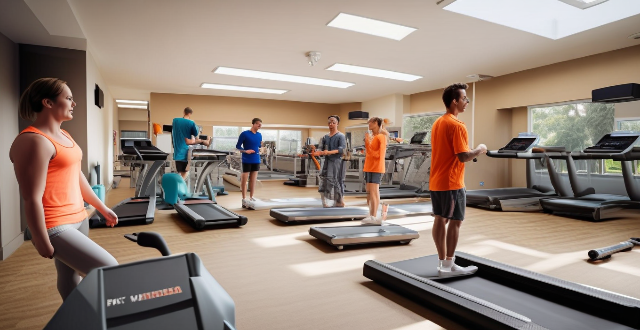
What role does genetics play in determining an individual's potential for elite sports performance ?
Genetics plays a significant role in determining an individual's potential for elite sports performance. Physical attributes, physiological characteristics, and psychological traits all contribute to success in sports. Height and body build, muscle composition and fiber type, oxygen uptake and energy production, recovery and injury resistance, motivation and mental toughness, and cognitive abilities are all influenced by genetics. However, environmental factors such as training, nutrition, and coaching also play a crucial role in an athlete's development and success.

What is the ideal meal timing for optimal sports performance
The ideal meal timing for optimal sports performance is crucial for athletes to maximize their potential. Proper nutrition can help improve endurance, strength, and overall performance during physical activities. Key points to consider when planning meals include eating a pre-workout meal containing carbohydrates, protein, and healthy fats 2-3 hours before exercise; staying hydrated throughout the day; consuming simple carbohydrates during longer workouts; eating a post-workout meal rich in protein and carbohydrates within 30 minutes after exercising; and avoiding eating too close to workout time. By following these guidelines, athletes can ensure they have the necessary fuel for their bodies to perform at their best.

What are the best ways to enhance athletic performance ?
Improving athletic performance involves a combination of physical, mental, and lifestyle factors. Here are some strategies that can help athletes reach their full potential: ## Physical Training ### Strength and Conditioning - Incorporating weight training helps build muscle strength and endurance. - Plyometrics exercises like box jumps and bounding improve power output, crucial for many sports. ### Technique and Drills - Perfect practice makes perfect; focusing on the quality of movements rather than just quantity. - Practicing game scenarios can enhance decision-making skills under pressure. ### Recovery - Light activities like walking or swimming can aid recovery. - Stretching and foam rolling help reduce muscle soreness and improve flexibility. ## Nutrition and Hydration ### Diet - Consuming a mix of proteins, carbohydrates, and healthy fats supports energy levels and recovery. - Drinking enough water is essential for maintaining performance and preventing cramps. ### Supplementation (When Needed) - Sports drinks during prolonged exercise can replenish electrolytes and provide energy. - Post-workout protein shakes can aid in muscle repair. ## Mental Preparation ### Visualization - Seeing yourself succeed in your mind's eye can boost confidence and focus. - Setting clear, achievable goals provides direction and motivation. ### Mindfulness and Stress Management - Meditation can reduce anxiety and improve concentration. - Controlled breathing can lower stress levels before and during competition. ## Lifestyle Habits ### Sleep - Athletes need adequate rest to recover physically and mentally. - Maintaining a consistent sleep schedule optimizes rest. ### Avoiding Negative Habits - Substances can impair judgment and harm performance. - High stress levels can negatively impact both physical and mental health.

What are the most common metrics used in analyzing sports performance ?
Analyzing sports performance is crucial for athletes, coaches, and teams to improve their skills, strategies, and overall performance. There are several metrics used to evaluate different aspects of sports performance, including time-based metrics such as speed and pace; distance-based metrics such as distance covered and displacement; power-based metrics such as peak power and power endurance; technique-based metrics such as form analysis and biomechanical analysis; physiological metrics such as heart rate and VO2 max; and mental metrics such as mental toughness and motivation levels. These metrics can help athletes and coaches identify areas for improvement and develop effective training programs to enhance performance.

What role does mental preparation play in improving running performance ?
Mental preparation is key to improving running performance. It involves setting clear goals, using visualization techniques, practicing mindfulness exercises, and employing self-talk strategies. By training the mind to focus on the task at hand, manage stress, and maintain motivation, runners can enhance their physical performance and achieve their running goals.

How does climate change affect the performance of athletes in outdoor sports ?
Climate change significantly impacts outdoor sports by altering temperature, precipitation patterns, and air quality. Athletes face challenges such as dehydration, heat-related illnesses, muscle injuries from cold weather, event cancellations due to heavy rainfall, reduced efficiency in drought conditions, and respiratory problems from increased pollutants. Altered seasons disrupt training schedules and event scheduling. Strategies for adaptation include flexible scheduling, indoor alternatives, advanced performance wear, environmental simulation in training, health education, and readily available medical care during competitions.

What are the benefits of attending a high-performance tennis training camp ?
Attending a high-performance tennis training camp can significantly improve players' skills and overall performance. These specialized programs offer a range of benefits, including technical skill enhancement, physical conditioning, mental toughness development, exposure to high-level competition, networking opportunities, personalized instruction, and off-court education. With a focus on stroke technique, footwork drills, strategy development, strength and cardiovascular training, flexibility, mental preparation, and stress management, these camps are designed to foster a competitive mindset and prepare players for the rigors of professional tennis. Additionally, the chance to play against strong opponents, receive feedback from experienced coaches, and connect with peers and potential mentors further enhances the value of these camps. Personalized training plans, goal setting workshops, and video analysis also contribute to the comprehensive nature of the training. Beyond physical and technical improvement, camps provide education on nutrition, sports psychology, and equipment knowledge, ensuring that participants are well-equipped both on and off the court. Overall, high-performance tennis training camps offer a holistic approach to tennis development, making them an invaluable resource for players looking to elevate their game.

How does hydration impact athletic performance and health ?
Hydration is crucial for athletic performance and health. Adequate hydration maintains energy levels, muscle function, joint lubrication, heart rate, and cognitive function during exercise. Dehydration can lead to fatigue, muscle cramping, increased heart rate, impaired cognitive abilities, and decreased physical performance. Proper hydration also aids digestion, kidney function, skin health, immune system function, and body temperature regulation. Chronic dehydration can increase the risk of kidney stones, digestive issues, weakened immune system, and other health problems. Therefore, it is essential for athletes to stay well-hydrated to achieve optimal performance levels and support their overall health.

How does dehydration during exercise affect performance and physiological responses ?
Dehydration during exercise can significantly impact performance and physiological responses. It decreases blood volume, impairs thermoregulation, affects cognitive function, increases heart rate and blood pressure, causes respiratory alkalosis, leads to muscle cramping and stiffness, and alters metabolic processes. Athletes should stay hydrated to avoid these negative effects.
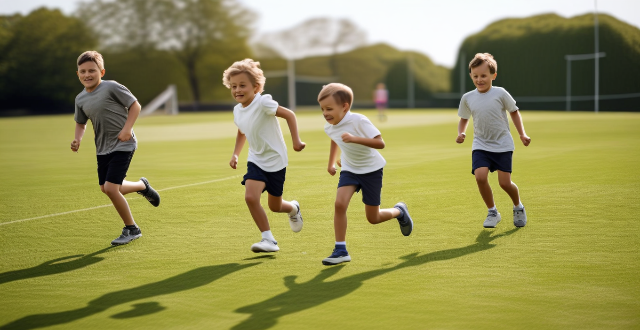
How can nutrition affect an athlete's performance ?
Nutrition plays a pivotal role in an athlete's performance, providing essential energy, aiding recovery, and maintaining overall health. A balanced intake of macronutrients, such as carbohydrates for immediate energy, proteins for muscle repair and growth, and fats for long-term energy, is crucial. Micronutrients like vitamins and minerals also contribute to metabolic functions and electrolyte balance. Hydration is vital for fluid balance and preventing performance decline due to dehydration. Timing of nutrient intake, before, during, and after exercise, significantly impacts performance and recovery. Strategic dietary planning, including periodized nutrition and anti-doping compliance, ensures athletes meet their specific needs and maintain clean sport standards. Overall, a well-structured nutritional plan can enhance athletic performance and success in sports.

How does exercise physiology contribute to understanding the aging process and its effects on physical performance ?
Aging is a complex biological process that affects all living organisms, involving a gradual decline in physical and mental functions over time. Exercise physiology, the study of how the body responds to exercise, plays a crucial role in understanding the aging process and its effects on physical performance. As we age, our muscle mass and strength tend to decrease, cardiovascular fitness reduces, and joint pain and stiffness become more common. Exercise physiology helps us understand how the body adapts to regular physical activity at different stages of life, preventing age-related declines and promoting healthy aging through targeted exercise programs.

How can sports medicine improve an athlete's performance ?
Sports medicine can improve an athlete's performance by focusing on injury prevention and management, optimal recovery strategies, mental health support, performance enhancement through strength and conditioning programs, biomechanical analysis, pain management, and medical care and treatment. It involves a holistic approach to addressing an athlete's physical health, mental well-being, nutrition, and recovery processes.
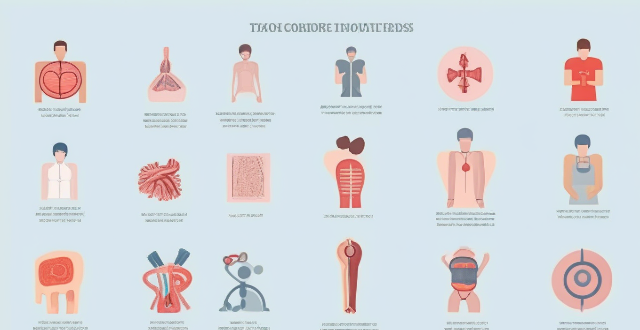
How does a warm-up affect performance in sports ?
Warming up before sports activities is crucial for enhancing performance and preventing injuries. A proper warm-up increases blood flow to the muscles, reduces injury risk, improves coordination and reaction time, and provides mental preparation. There are different types of warm-ups, including general warm-up, specific warm-up, and dynamic stretching. Incorporating these warm-up activities can optimize an athlete's performance and minimize the risk of injuries during competition.

How does sleep quality affect athletic performance and health ?
This text explains how sleep quality affects athletic performance and overall health. It emphasizes the importance of sleep for physical recovery, mental well-being, and immune system support in athletes. Poor sleep quality can lead to decreased performance, increased injury risk, and mental health issues. The text provides tips for improving sleep quality, such as establishing a consistent sleep schedule and creating a comfortable sleep environment. Adequate sleep is crucial for optimal athletic performance and overall health.

Is there a connection between physical fitness levels and academic performance in children ?
This text discusses the potential correlation between physical fitness levels and academic achievement in children, highlighting research findings that suggest a positive relationship. It outlines various mechanisms through which physical activity may improve cognitive functions and behavior, leading to better academic performance. The text also emphasizes the importance of incorporating physical education into school programs and encourages family and community involvement in promoting physical activities among children.
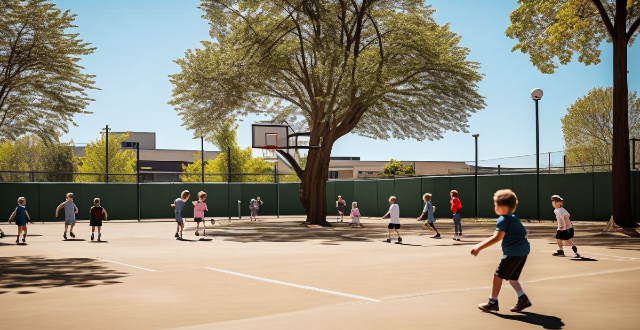
Are there specific sports that improve academic performance in children ?
The article discusses the potential benefits of different types of sports on academic performance in children. It highlights team sports like basketball, soccer, and volleyball for their ability to teach social skills, time management, and discipline. Individual sports such as swimming, tennis, and gymnastics are noted for promoting self-discipline, goal setting, and mental toughness. Outdoor sports like hiking, cycling, and rock climbing are mentioned for providing physical activity, stress relief, and exploration opportunities. The conclusion emphasizes the importance of considering individual differences among children when encouraging sports participation for academic improvement.

How can sports research and development improve athletic performance at all levels ?
Sports research and development (R&D) play a crucial role in enhancing athletic performance across various levels, from amateur to professional athletes. By employing scientific methods, technology, and data analysis, sports R&D helps athletes optimize their training, improve technique, prevent injuries, and ultimately achieve better results. Key areas of impact include biomechanics and technique optimization, training methodologies, nutrition and recovery, mental training, and injury prevention and rehabilitation. Implementation strategies involve a collaborative approach, continuous learning, individualization, and embracing technology. Sports R&D offers a multitude of avenues to enhance athletic performance, and the integration of cutting-edge science and technology will continue to drive advancements in sport, pushing the boundaries of human performance further than ever before.

Can strength training help improve my running performance ?
Strength training is an essential component of any fitness program, including running. It helps to build muscle strength and endurance, which can significantly improve your running performance. Strength training can help increase muscle strength and endurance, improve running economy, reduce the risk of injury, and enhance posture and body alignment. To incorporate strength training into your running routine, start slowly with light weights and gradually increase intensity over time. Choose exercises that target major muscle groups used during running, such as glutes, hamstrings, quadriceps, calves, and core muscles. Incorporate plyometric exercises to improve explosive power and acceleration. Allow sufficient recovery time between sessions to avoid overtraining and potential injuries.

What is the relationship between sleep and recovery in high-level sports performance ?
Sleep is a vital component of recovery for high-level athletes, playing a significant role in muscle repair, energy restoration, immune function, cognitive function, and emotional well-being. Optimal sleep can lead to improved performance, reduced injury risk, enhanced learning and adaptation, increased motivation and focus, and better weight management. To maximize the benefits of sleep for recovery, athletes should establish good sleep habits such as maintaining a consistent sleep schedule, creating a conducive sleep environment, limiting caffeine and alcohol intake, practicing relaxation techniques, and avoiding naps or keeping them short and early in the day.
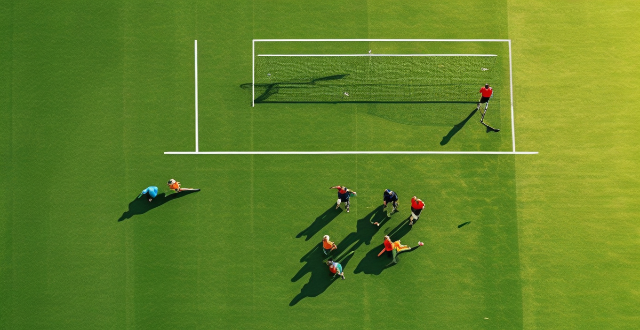
To what extent do technological advancements (like improved equipment and analytics) influence sports performance at the highest level ?
Technology has significantly impacted sports performance through improved equipment, advanced analytics, and enhanced training methods. Lightweight materials, aerodynamic designs, and customized gear have boosted athlete performance. Safety measures and recovery tools have minimized injuries and accelerated healing. Smart devices and simulation tools aid efficient training. Advanced analytics aid in performance tracking, strategy development, and team management. However, these advancements may create disparities between teams with unequal access to technology. They also raise debates on skill versus technology's role in sports. Despite concerns, technology enhances fan engagement through interactive experiences and data visualization. As technology advances, governing bodies must ensure equitable access and maintain fair competition while embracing its role in shaping the future of sports.